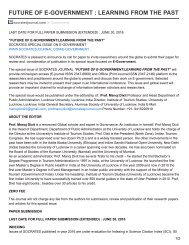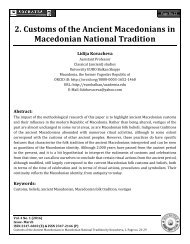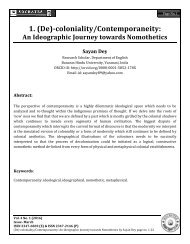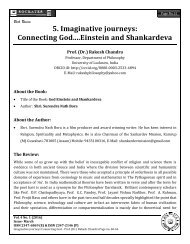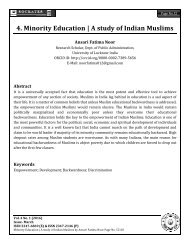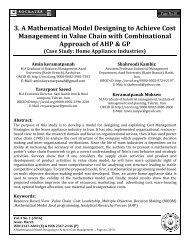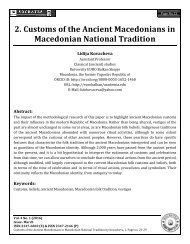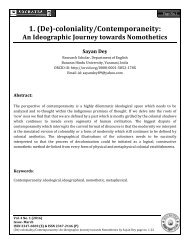FUTURE OF E-GOVERNMENT:LEARNING FROM THE PAST” SOCRATES SPECIAL ISSUE ON E-GOVERNMENT
http://socratesjournal.com/e-Government/
http://socratesjournal.com/e-Government/
You also want an ePaper? Increase the reach of your titles
YUMPU automatically turns print PDFs into web optimized ePapers that Google loves.
<strong>FUTURE</strong> <strong>OF</strong> E-<strong>GOVERNMENT</strong> : <strong>LEARNING</strong> <strong>FROM</strong> <strong>THE</strong> PAST<br />
socratesjournal.com /e-Government/<br />
LAST DATE FOR FULL PAPER SUBMISSI<strong>ON</strong> (EXTENDED) : JUNE 30, 2016<br />
“<strong>FUTURE</strong> <strong>OF</strong> E-<strong>GOVERNMENT</strong>:<strong>LEARNING</strong> <strong>FROM</strong> <strong>THE</strong> <strong>PAST”</strong><br />
<strong>SOCRATES</strong> <strong>SPECIAL</strong> <strong>ISSUE</strong> <strong>ON</strong> E-<strong>GOVERNMENT</strong><br />
WWW.<strong>SOCRATES</strong>JOURNAL.COM/E-<strong>GOVERNMENT</strong><br />
<strong>SOCRATES</strong> is pleased to announce its call for paper to invite researchers around the globe to submit their paper for<br />
review and consideration of publication in its special issue focused on E-Government.<br />
The special issue of <strong>SOCRATES</strong> JOURNAL “<strong>FUTURE</strong> <strong>OF</strong> E-<strong>GOVERNMENT</strong>:<strong>LEARNING</strong> <strong>FROM</strong> <strong>THE</strong> <strong>PAST”</strong> will<br />
provide online/open access (E-journal ISSN 2347-6869) and Offline (Print Journal ISSN 2347-2146) platform to the<br />
researchers and practitioners around the globe to present and discuss their work on E-government. Selected<br />
researchers may be invited to present their paper in an International conference. This issue and global event will<br />
provide an important channel for exchange of information between scholars and researchers.<br />
The special issue would be published under the editorship of: Prof. Manoj Dixit Professor and Head Department of<br />
Public Administration, Lucknow University, Lucknow India Director, Institute of Tourism Studies, University of<br />
Lucknow, Lucknow, India General Secretary, Alumnae Society of University of Lucknow, India E-Mail:<br />
manojdixit23@gmail.com, profmanojdixit@socratesjournal.com Phone Number: +91- 9415220919<br />
ABOUT <strong>THE</strong> EDITOR<br />
Prof. Manoj Dixit is a renowned Global scholar and expert in Governance. An institution in himself, Prof Manoj Dixit<br />
is the Head of Department, Department of Public Administration at the University of Lucknow and holds the charge of<br />
the Director at the University’s Institute of Tourism Studies. Prof. Dixit is the President (North Zone), Indian Tourism<br />
Congress. He has supervised over two dozen Ph.D.s and is a widely traveled person. His other involvements in the<br />
past have been with in the Addis Ababa University (Ethiopia) and Indira Gandhi National Open University, New Delhi<br />
(India) besides the University of Lucknow in a career spanning over two decades. He has also been nominated on<br />
the Board of Studies of the Kumaon University (Nainital) and the University of Mumbai.<br />
As an academic administrator, Prof. Manoj Dixit has several ‘firsts’ to his credit – he started the first Bachelor’s<br />
Degree Programme in Tourism Administration in 1997 in India, at the University of Lucknow. He launched the first<br />
ever Master’s Degree in Public Health in India at the University of Lucknow in the year 2009 and now in 2010 the<br />
first ever Master’s Degree in Event Management in an Indian public university with the support of the Ministry of<br />
Tourism (Government of India). Under his headship, Institute of Tourism Studies (University of Lucknow) became the<br />
first Indian University to have successfully trained over 850 tourist guides in the state of Uttar Pradesh in 2010. Prof.<br />
Dixit has eight books ; besides over 30 articles to his credit.<br />
ZERO FEE<br />
The Journal will not charge any fee from the authors for submission, review and publication of their research papers<br />
and articles for this special issue.<br />
PAPER SUBMISSI<strong>ON</strong><br />
LAST DATE FOR FULL PAPER SUBMISSI<strong>ON</strong> (EXTENDED) : JUNE 30, 2016<br />
INDEXING<br />
Issues of <strong>SOCRATES</strong> published in year 2016 are under evaluation for Indexing in Science Citation Index (SCI), ISI<br />
1/2
Web of Knowledge and Web of Science (Thomson Reuters), and SCOPUS.<br />
LINK WITH US<br />
Please share this information within your network, colleagues, and friends, and share our informative poster on your<br />
departmental websites/notice boards (Click here to download).<br />
2/2
<strong>THE</strong>ME FOR DISCUSSI<strong>ON</strong><br />
socratesjournal.com /e-Government/theme-for-discussion/<br />
Since the emergence of Public choice theory, New Public Management and Re-inventing government in 1990s,<br />
governments around the world are attempting to improve the system of public service delivery. The Information age<br />
and its rapid stride in the 2000s facilitated the re-invention of governments and prepare them to serve the needs of<br />
a diverse society. The information age has redefined the fundamentals and transformed the institutions and<br />
mechanisms of service delivery forever. The vision is the articulation of a desire to transform the way government<br />
function and it relates to its constituents. This concern gave rise to the concept of E-Government. It was being<br />
felt that E-government can be more productive version of government in general, if it is well implemented and<br />
managed.<br />
E-Government has been witnessed as application of Information and Communication Technology (ICT) to the<br />
process of government functionalities for Good Governance. It is an initiative to achieve better government through<br />
electronised and sophisticated transformation of the traditional government operations and functions to an efficient,<br />
effective, transparent and accountable government. It is also an initiative to positively alter the relationship of the<br />
government with the public through public participation and engagement and better information and service<br />
delivery.E-government consists of the digital interactions between a citizen and their government (C2G), between<br />
governments and government agencies (G2G), between government and citizens (G2C), between government and<br />
employees (G2E), and between government and businesses/commerce (G2B). This digital interaction consists of e-<br />
citizen at all levels of government (city, state/province, national, and international), governance, information and<br />
communication technology (ICT), and business process re-engineering (BPR). (Jeong (2007) Fundamental of<br />
Development Administration. Selangor: Scholar Press. ISBN 978-967-5-04508-0).<br />
The ICT revolution on the global level affected the second world and third world countries as well, and it was being<br />
felt that they cannot isolate themselves from the IT revolution and its effect on administrative systems and the<br />
process of delivery of Information and, services. Therefore a large number of initiatives were undertaken by various<br />
countries to usher in an era of e- Government. Sustained efforts have been made in these countries at multiple<br />
levels to improve the delivery of public services and simplify the process of accessing them. The significance of E-<br />
government has being widely recognized as technological advancements facilitate the administrative systems by<br />
enabling Administrative Development and Effective service delivery.<br />
As the traditional form of Government, around the world, is rapidly transforming into modern E-Governments it<br />
becomes essential to discuss this entire process of transformation, the phases of re-engineering, projects and<br />
experiments and initiatives taken by various governments in this direction. There is also a need to find out the key<br />
issues and emerging challenges, their measures for the effective implementation of ICT in Government Business<br />
(Delivery of Information and services).<br />
In this new era of Digital Government “Future of E-Government : Learning from the past” (Socrates special issue on<br />
E-Government) wishes to act as a global platform and important channel of exchange for the researchers and<br />
practitioners to present and discuss their research work and, to share their experiences on this global contemporary<br />
issue.<br />
Based on the above following is the key theme for discussion:<br />
1. The basic concepts of ICT development and e-government.<br />
2. The evolution of ITC, its content and its applications, with particular reference to e-government. This area of<br />
e-government includes: reconstruction of government structure, re-engineering of business processes,<br />
computerization of various executive and operational activities, and the provision of better services to its<br />
1/3
clients, so as to establish a government of the information age.<br />
Sub-themes:<br />
• Rapid Development of Information Technology<br />
• Government Informatization<br />
• Government Online and E-Government Modeling of Government Business<br />
• E-Government Readiness Assessment<br />
• Metadata<br />
• E-Government Security Risk Management<br />
• Business Continuity Planning<br />
3. Infrastructure for E-Government Development: Discussion on the fundamental infrastructures that is required<br />
for the success of e-government development. Different information-related infrastructures that are<br />
fundamental to the implementation of e-government, such as e-record, portals, and e-payment. These infostructures<br />
are important to enable interoperability among government programmes, both for information<br />
sharing and for business transactions. The wide range of management issues, such as content management,<br />
knowledge management, storage management, and metadata.<br />
Sub themes:<br />
• Info-Structure: e-Record<br />
• Info-Structure: Authentication and Digital Signature<br />
• Info-Structure: e-Payment<br />
• Info-Structure: Portal<br />
• Change Management<br />
• Content Management<br />
• Storage Management<br />
• Knowledge Management<br />
• Information Management<br />
4. Strategies and Methodologies for E-Government: Discussion on high-level concerns on e-government<br />
sustainable development. Various policies, laws and regulations that help to facilitate e-government<br />
development, so that a government can achieve e-government milestones in a relatively short period of time.<br />
It should also addresses the critical success factors for e-government sustainable development, which is<br />
essential information for government leaders, including leadership and commitment of top management and<br />
continuous funding for e-government projects.<br />
Sub-themes:<br />
• Transformation of Government<br />
• e-Government Strategies<br />
• e-Government Policies Related Laws and Regulations<br />
• e-Government Related Standards<br />
• Methodologies of e-Government Systems Development<br />
• Critical Success Factors of e-Government<br />
• Funding of e-Government<br />
5. E-Government Interoperability : Discussion on the value of e-government interoperability and the steps<br />
required to achieve effective interoperability. Fundamental questions, such as ‘who should be involved in e-<br />
Government Interoperability projects’; ‘why a Government Interoperability Framework (GIF) should be<br />
developed’; ‘how GIFs are produced and revised’; and ‘what the key factors are for the successful<br />
development and operationalization of a GIF’.<br />
Sub-themes:<br />
• Standards and Architecture in Interoperability<br />
• Government Interoperability Framework (GIF)<br />
• GIF Development<br />
• Architecture<br />
2/3
6. E-Government: Key issues and emerging challenges, Measures to solve these key issues and emerging<br />
challenges.<br />
7. E-Governance: Key issues and emerging challenges, Measures to solve these key issues and emerging<br />
challenges.<br />
8. The Current e-government uptake situation: Measures taken by the government to identify the Current<br />
Situation, Policy strategies and actions taken by the Government to increase e-government uptake, E-<br />
Government uptake: evaluation and monitoring system, Measures to increase e-Government uptake.<br />
Etc.<br />
Paper submission:<br />
Authors and contributors can send their paper via e-mail to any of these e-mail addresses: editor@socratesjournal.com, manojdixit23@gmail.com, profma<br />
Full Papers can be submitted through the online paper submission mechanism available on:<br />
http://socratesjournal.com/e-Government/paper-submission/<br />
3/3
<strong>FUTURE</strong> <strong>OF</strong> E-<strong>GOVERNMENT</strong> : <strong>LEARNING</strong> <strong>FROM</strong> <strong>THE</strong> PAST<br />
socratesjournal.com /e-Government/paper-submission/<br />
<strong>ON</strong>LINE PAPER SUBMISSI<strong>ON</strong><br />
Author Guidelines:<br />
Authors please ensure:<br />
1. Paper is in .DOC format<br />
2. Paper is in APA Format<br />
3. Paper must contain Abstract and Keywords.<br />
4. Author should ensure that the Research Paper/Article sent for publication is not published/presented<br />
anywhere else. If it happens so, the author will be entirely responsible for any legal action. There would be no<br />
responsibility of the journal, editor and referees.<br />
5. For this special issue submitted papers/articles would be refereed/reviewed.<br />
6. The articles submitted for publication should be exclusive for this special issue and must not be submitted<br />
elsewhere during their consideration by the journal. These must not carry any material already published in<br />
the same or different forms.<br />
7. The article should present a complete picture of the investigation made and should not be split into parts. In<br />
the articles, proper continuity should be maintained in presentation of information.<br />
8. Each article should be written correctly, clearly, objectively and concisely. All the statements made in the<br />
manuscript should be clear, unambiguous, and to the point.<br />
9. There is no prescribed limit regarding the number of pages in case of full-length article. However, the length of<br />
article should not be less than 2 full printed pages of the journal.<br />
10. Articles should be suitably divided into two sections: Abstract and Full Text Full Text should contain<br />
References.<br />
11. Title of article should be informative. It should indicate the content of the article essential for keyword &<br />
indexing.<br />
Paper submission:<br />
Authors and contributors can send their paper via e-mail to any of these e-mail addresses: editor@socratesjournal.com, manojdixit23@gmail.com, profma<br />
Full<br />
Full<br />
Papers<br />
Papers<br />
can be<br />
can<br />
submitted<br />
be submitted<br />
through the<br />
through<br />
online paper<br />
the<br />
submission<br />
online paper<br />
mechanism<br />
submission<br />
available on<br />
mechanism<br />
our website:<br />
available below:<br />
http://socratesjournal.com/e-Government/paper-submission/<br />
1/1




